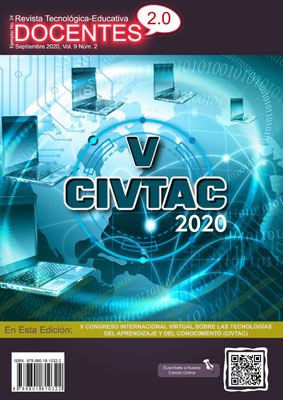Metacognitive Strategy in Significant Learning Using Illustrated Stories
 DOI:
https://doi.org/10.37843/rted.v9i2.168
DOI:
https://doi.org/10.37843/rted.v9i2.168
Main Article Content
Abstract
Given the current social demands, the challenges in education require a human approach in turn to have cutting-edge content, in this context, the teacher must develop and implement various dynamic strategies aimed at stimulating cognitive, affective and psychological processes in The student, therefore, the teaching of metacognitive strategies emerges as an integration of practices aimed at promoting self-regulated and meaningful learning, the present work proposed as an objective to propose a metacognitive strategy aimed at promoting meaningful learning in Higher Education students from the elaboration of Illustrated Tales. To comply with the proposed objective, a qualitative and quantitative methodology was proposed focused on knowing metacognitive processes used by a group made up of 25 higher education students who prepared an illustrated story in which they reflected theoretical concepts and methodologies used in the analysis of facilities. industrial electricals. The elaboration of illustrated stories reveals metacognitive skills used by students when translating them into stories through arguments and graphic elements, this resource is not opposed to formal and deep work since it is based on previously known and studied concepts. The purpose of the proposed strategy affects the teaching-learning process, promoting the development and execution of various mental structures that activate previous knowledge that is complemented with new information under study.
Downloads
Metrics
Article Details

This work is licensed under a Creative Commons Attribution-NonCommercial-NoDerivatives 4.0 International License.
Those authors who have publications in our journal accept the following terms:
- When a work is accepted for publication, the author retains rights of reproduction, distribution of his/her article for exploitation in all countries of the world in the format provided by our magazine and any other magnetic medium, optical, and digital.
- Authors will retain their copyright and guarantee the journal the right first to publish their work, which will be simultaneously subject to the Creative Commons Acknowledgment License (Attribution-NonCommercial-NoDerivatives 4.0 International (CC BY-NC-ND 4.0)). That allows third parties to copy and redistribute the material in any medium or format, under the following conditions: Acknowledgment - You must properly acknowledge authorship, provide a link to the license, and indicate if any changes have been made. You may do so in any reasonable way, but not in a way that suggests you have the licensor's endorsement or receive it for your use. NonCommercial - You may not use the material for a commercial purpose. NoDerivatives - If you remix, transform, or build from the material, you cannot broadcast the modified material. There are no additional restrictions - You cannot apply legal terms or technological measures that legally restrict you from doing what the license allows.
- Authors may adopt other non-exclusive license agreements to distribute the published version of the work (e.g., deposit it in an institutional archive or publish it in a monographic volume) provided that the initial publication in this journal is indicated.
- Authors are allowed and recommended to disseminate their work through the Internet (e.g., in institutional telematic archives, repositories, libraries, or their website), producing exciting exchanges and increasing the published work's citations.
- Request of withdrawal an article has to be done in writing by the author to the Editor, becoming effective after a written response from the Editor. For this purpose, the author or authors will send correspondence via e-mail: [email protected].
- The author will not receive financial compensation for the publication of his work.
- All Docentes 2.0 Journal publications are under the Open Journal System (OJS) platform at: https://ojs.docentes20.com/.
References
Baur, E. (1978) La historieta como experiencia didáctica, Ed. Nueva Imagen, México.
Bruin, A., & Gog, T. (2012). Improving self-monitoring and self-regulation: From cognitive psychology to the classroom. Learning and Instruction,22, 245-252.
Downing, K., Kwong, T., Chan, S., Lam, T., & Downing, W. (2008). Problem-based learning and the development of metacognition.Higher Education,57(5),609-621.
Flavell, J. (1979). Metacognition and cognitive monitoring: A new area of cognitive-developmental inquiry. American Psychologist, 34(10), 906-911.
Fox, E., & Riconscente, M. (2008). Metacognition and self-regulation in James, Piaget, and Vygotsky.Educational Psychology Review,20,373-389.
Joseph, N. (2003). Metacognition in the classroom: Examining theory and practice. Pedagogy: Critical Approaches to Teaching Literature, Language, Composition, and Culture, 3(1), 109-114.
Klimenko, O. & Alvares, J. L. (2009). Aprender cómo aprendo: la enseñanza de estrategias metacognitivas. Colombia: La Sabana Ediciones.
Martin A. (1978) Historia del cómic español: 1875-1939, Ed. Gustavo Gil, Barcelona.
Merton, R. K., Torner, F. M., Borqués, R., & Bunge, M. (1964). Teoría y estructura sociales (No. 04; HM101, M4.). México: Fondo de Cultura Económica.
Muria, I. (1994). La enseñanza de las estrategias de aprendizaje y las habilidades
metacognitivas. México:Perfiles Ediciones.
Palincsar, A., & Brown, A. (1984). Reciprocal teaching of comprehension-fostering and comprehension-monitoring activities. Cognition and Instruction, 1(2), 117-175.
Rincón-Sierra, F. M. (2020). Análisis de la aplicación de la teoría cognitiva de Jerome Bruner como mecanismo para fortalecer la conducta ambiental en los estudiantes del Grado Segundo de la Institución. Revista Tecnológica-Educativa Docentes 2.0, 9(1), 132-141. https://doi.org/10.37843/rted.v9i1.110
Schraw, G. (1998). Promoting general metacognitive awareness. Instructional Science,26, 113-125.
Pimienta-Prieto, J. (2012). Estrategias de enseñanza-aprendizaje Docencia universitaria basada en competencias, Ed. Pearson educación. México.
Tobón, S. (2006). Docencia Metacognitiva y Competencias del Profesorado. Barcelona: Tributo Ediciones.
Velásquez-Ossa, C., López Jiménez, D., & Gómez Giraldo, J. (2009). La naturaleza de la comunicación: un aporte a su discusión conceptual.
Yepes, Ricardo.1996. Qué es eso de la filosofía. De Platón a hoy. Barcelona: Ediciones del Drac.






